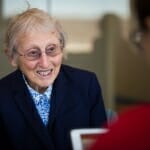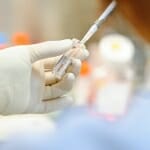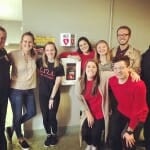Tag Health & medicine
Fast start, great mentors, natural aptitude and total passion: ingredients of a legendary career in nursing research
A faculty member for UW–Madison's School of Nursing for more than half a century, Karen Pridham has made her mark with her work on caring for severely ill children, many of them born highly prematurely, and their families. Read More
UW-Madison biomanufacturer offers essential gene-transfer capacity
A UW–Madison lab that makes proteins, antibodies and viruses has begun manufacturing a virus critical to experimental treatments for many genetic conditions. Read More
New imager identifies tissue types during surgery
UW-Madison spinoff company OnLume is continuing to develop its system for identifying tissue types during surgery. The company’s technology causes chemical labels to glow in the operating room. Read More
Stem cell symposium to highlight clinical trials, safety and regulation
Speakers at the annual Wisconsin Stem Cell Symposium will discuss clinical trials involving stem cells, safety considerations and the regulatory environment under which ongoing stem cell work takes place. Read More
Fueled by tragedy, Cardiac on Campus helps students take care of hearts
The organization hosts fundraising events to install AEDs, teaches students and community members CPR for free, and raises awareness about heart disease, the number one killer in the U.S. Read More
Use of mobile app reduced alcohol and drug use
The application called Seva provides a discussion board, interactive modules to teach problem solving, tools for coping with cravings and high-risk situations, and other features. Read More
As influenza looms, Madison firm advances human trials of revolutionary vaccine
One of the most promising universal flu vaccines is being developed by FluGen, a spinoff from the University of Wisconsin–Madison. Next up is an experimental trial. Read More
Study advances gene therapy for glaucoma
A new study shows an improved tactic for delivering new genes into the eye's drain, called the trabecular meshwork, offering a promising treatment for glaucoma. Read More
Waisman research into rare syndrome offers hope for families
Waisman Center research into the molecular mysteries of Rett Syndrome may ultimately help an 8-year-old girl who suffers from the rare neurological disorder. Read More
Lake Michigan waterfowl botulism deaths linked to warm waters, algae
UW-Madison researchers, with the help of citizen scientists, tracked bird deaths along Lake Michigan, and found that warm waters and algae apparently promoted the growth of botulism toxin-producing bacteria that caused them. Read More
Cracking the code of coenzyme Q biosynthesis
A research group is chipping away at many of these knowledge gaps in CoQ production and in understanding the role of CoQ deficiency in human diseases. Read More
Progress made toward treatment for rare, fatal neurological disease
Promising results in the lab and in animal models could set the stage for developing a treatment for Alexander disease, a rare and usually fatal neurological disease with no known cure. Read More
Better health through the humanities
A new certificate teaches students historical, cultural and philosophical ways people intersect with health care and provides them a broader, more nuanced understanding of health. Read More
Study: Yoga reduces falls among the elderly
Participants in a study saw significant improvements on two measures of walking gait, and on balance, after 8 weeks of yoga classes. Read More
Talking to doctors: Never simple, but getting tougher: Could this help?
UW-Madison professor of family medicine Paul Smith is leading the development and testing of Care Talks to help people improve communication with the medical system. Read More
Shelter Medicine, WVDL assist Dane County shelter with dog illness
“The shelter was on top of this very quickly,” says clinical assistant professor Sandra Newbury, who has been leading the response. Read More
New accelerated undergraduate nursing program to address workforce need
The campus-based, face-to-face program will enroll a cohort of 32 second-degree students who will begin coursework in May 2018 for the twelve-month, full-time, year-round program. Read More
Study: Medicaid Expansion Helped Reduce Reliance on Federal Income Assistance
“A rigorous debate about redesigning Medicaid requires accounting for the secondary effects of Medicaid on public programs beyond the health care sector,” said Dr. Marguerite Burns, assistant professor in Population Health Sciences. Read More




















